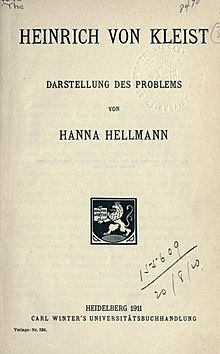Hanna Hellmann
Johanna Hellmann (born October 31, 1877 in Nuremberg ; † June 15, 1942 deported to Poland ) was a German literary scholar .
Life
Hellmann was born as the eldest daughter of the Nuremberg woodcarving dealer Lazarus Hellmann (1846–1915) and his wife Rosalie (née Hüttenbach, 1849–1926) and grew up in a middle-class family. In 1895 she passed the teacher exams at the Karlsruhe Prinzess-Wilhelm-Stift and in 1899 the senior teacher exam . She then studied in Heidelberg and Berlin, then went to Switzerland to continue her studies in Bern and Zurich. There she received her doctorate in 1910 with Heinrich von Kleist: The problem of his life and his poetry . A doctorate for women was not yet possible at universities in the German Reich . Your investigation of Heinrich von Kleist's essayAbout the Marionette Theater in her book Presentation of the Problem from 1911 proved to be groundbreaking in understanding Kleist's philosophy of life and art.
Hellmann moved to Frankfurt am Main in 1911, and her mother moved in with her after her father's death. Like her brother-in-law Carl Gebhardt , who also lives in Frankfurt, she wrote articles for the features section of the Frankfurter Zeitung , as well as for Euphorion and the Romanisch-Germanic monthly magazine . In Gebhardt's house (her sister Lilly's husband), she met Else Lasker-Schüler , Albert Schweitzer and Martin Buber . After the First World War , she campaigned for women's suffrage in articles . She taught at the seminar for social work in Frankfurt. From 1926 onwards, changes in personality became noticeable in her, which led to increasingly isolation.
On May 25, 1938, she was admitted to the city mental hospital in Frankfurt am Main. Her sister Lilly Gebhardt had her brought on September 21, 1938 to the Wiesneck sanatorium in Buchenbach near Freiburg im Breisgau , which was run by Friedrich Husemann according to anthroposophical principles . On July 31, 1939, she came from there to the Jakobi sanatorium in Sayn near Koblenz , where Jewish nervous patients were admitted .
On June 15, 1942, Hanna Hellmann was transported from Sayn to the Izbica ghetto , where she is lost. Presumably she was murdered there afterwards.
Fonts
- Heinrich von Kleist: The problem of his life and his poetry , Winter, Heidelberg, 1910, revised version under the title: Heinrich von Kleist. Presentation of the problem , Winter, Heidelberg, 1911, 82 pp.
- Bergson and Germany's War of Freedom , "Frankfurter Zeitung", Frankfurt am Main, August 20, 1914.
- Kleist's Amphitryon. In: August Sauer et al. (Ed.): Euphorion. Volume 25, CC Buchner, 1924.
- Heinrich von Kleist and "Der Kettträger" , in: Germanisch-Romanische MONTHLY 13, 1925, pp. 350–363.
- About the puppet theater , reprinted in: Walter Müller-Seidel, Kleist's essay on the puppet theater: Studies and Interpretations , Schmidt, Berlin, 1967, pp. 17–31.
literature
- Jutta Dick, Marina Sassenberg (Hrsg.): Jewish women in the 19th and 20th centuries: Lexikon zu Leben und Werk , Rowohlt, 1993, ISBN 3-49916344-6 , p. 167 ff
- Klara Klein: Hanna Hellmann , Ner-Tamid-Verlag, Erlangen / Fürth, 1968, 112 p., (Biography)
Individual evidence
- ↑ Frauenstimmrecht, Krieg und Frieden , in: Die Frau (edited by Helene Lange and Gertrud Bäumer), 26th year, issue 11, August 1919. pp. 325–328
Web links
| personal data | |
|---|---|
| SURNAME | Hellmann, Hanna |
| ALTERNATIVE NAMES | Hellmann, Johanna |
| BRIEF DESCRIPTION | German literary scholar |
| DATE OF BIRTH | October 31, 1877 |
| PLACE OF BIRTH | Nuremberg |
| DATE OF DEATH | June 15, 1942 |
